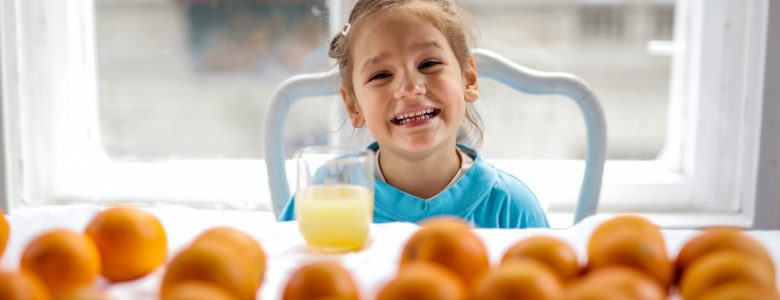
Fruit Juice on Kid’s Oral Health: Separating Fact from Fiction
Introduction
Fruit juice has long been considered a popular beverage choice for children due to its sweet taste and perception of being a healthier alternative to soda and other sugary drinks. However, there is growing concern among parents and Pediatric Dentists about the potential impact of fruit juice on children’s oral health. This article from Petit Smiles aims to explore the relationship between fruit juice consumption and oral health in kids, presenting evidence-based information to help parents make informed decisions about their children’s dietary choices. Remember to follow us on Instagram to know more about dental practices for healthy, strong teeth and gums.
Understanding Fruit Juice Composition
Fruit juice is made from the liquid extracted from fruits, containing a mix of natural sugars, vitamins, minerals, and antioxidants. While it can be a source of essential nutrients, it is essential to recognize that fruit juices often lack the dietary fiber present in whole fruits. This absence of fiber can affect how the sugars in the juice interact with teeth.
Acid Content in Fruit Juice
One of the primary concerns about fruit juice consumption is its acidity. Citrus fruits, for instance, are naturally acidic, and their juices can erode tooth enamel over time. The prolonged exposure of teeth to acidic substances weakens the protective enamel layer, making them susceptible to cavities and sensitivity.

Sugar Content and Dental Decay
Most fruits contain natural sugars, such as fructose and glucose. When fruits are juiced, the sugars become concentrated, increasing the potential for tooth decay. The bacteria present in the mouth feed on these sugars, producing acids that attack the enamel and lead to cavities. While 100% fruit juice may seem like a healthier option than soda or sugary drinks, it still poses a risk to dental health when consumed in excess.
Frequency and Timing of Fruit Juice Consumption
The frequency and timing of fruit juice consumption also play a vital role in its impact on oral health. Sipping fruit juice throughout the day or between meals exposes the teeth to sugar and acids continually, providing bacteria with a steady supply of nutrients. Conversely, consuming fruit juice during mealtime can be less harmful, as increased saliva production during eating helps neutralize acids and rinse away sugar residues.
Healthy Alternatives
As an alternative to fruit juice, parents can encourage their children to consume whole fruits. Whole fruits contain dietary fiber, which can help slow down sugar absorption and promote overall oral health. Additionally, water is the best beverage choice for hydration and dental health. Encourage children to drink water between meals to wash away food particles and maintain a balanced pH level in the mouth.
Promoting Good Oral Hygiene
Teaching and reinforcing good oral hygiene practices are crucial in mitigating the potential negative effects of fruit juice or any other sugary beverages. Regular brushing, flossing, and dental check-ups are essential components of maintaining oral health. Moreover, educating children about the importance of oral care and limiting sugary drink consumption empowers them to make healthier choices independently.
Parental Role in Making Informed Choices
Parents play a pivotal role in shaping their children’s dietary habits and oral health practices. By being aware of the potential consequences of excessive fruit juice consumption, parents can take proactive measures to limit its intake and provide healthier alternatives. Furthermore, involving children in grocery shopping and meal planning can encourage them to develop a preference for whole fruits and water over sugary beverages.
Addressing Fruit Juice Marketing and Packaging
Our Pediatric Dentists believe that it’s essential for parents to scrutinize the marketing claims and labels on fruit juice products. Many packaged juices may contain added sugars, preservatives, and artificial flavors, which can further contribute to dental issues. Opt for 100% natural, no-sugar-added fruit juices or, even better, whole fruits.
| Tips for Kids’ Oral Health and Fruit Juice Consumption |
|---|
| 1. Limit Consumption |
| 2. Mealtime is Best |
| 3. Choose 100% Natural |
| 4. Rinse with Water |
| 5. Promote Oral Hygiene |
| 6. Be a Role Model |
| 7. Educate and Involve |
| 8. Dilute if Necessary |
| 9. Drink with a Straw |
| 10. Monitor and Adjust |
| Recommended Beverage Choices for Kids’ Oral Health |
|---|
| 1. Water |
| 2. Milk |
| 3. Herbal Teas |
| 4. Whole Fruits |
| 5. 100% Natural Fruit Juice (in moderation) |
| 6. Limited Flavored Drinks |
| 7. Avoid Sugary Sodas and Energy Drinks |
Remember, establishing good oral hygiene habits and making informed choices about beverage consumption can significantly impact your child’s oral health. Encourage a balanced diet and regular dental check-ups to ensure a healthy and bright smile for your little ones! 🦷😄
Conclusion
While fruit juice can be a part of a child’s diet in moderation, it is essential to be mindful of its potential impact on oral health. The acidity and sugar content in fruit juice can contribute to dental decay if consumed excessively or improperly. Any Pediatric Dentist will tell you that encouraging a balanced diet, limiting fruit juice consumption, and promoting good oral hygiene practices will help safeguard children’s smiles and overall well-being. By making informed choices, parents can strike a balance between providing their children with enjoyable beverages and prioritizing their oral health, setting them on a path for a lifetime of healthy habits.
It is always good to seek expert advice to prevent your child from going without proper dental care. You can book your appointment with us at Petit Smiles to get the most professional and adequate advice for your child as we have the best Dental Offices in Doral and Coral Gables in Florida.
Contents


